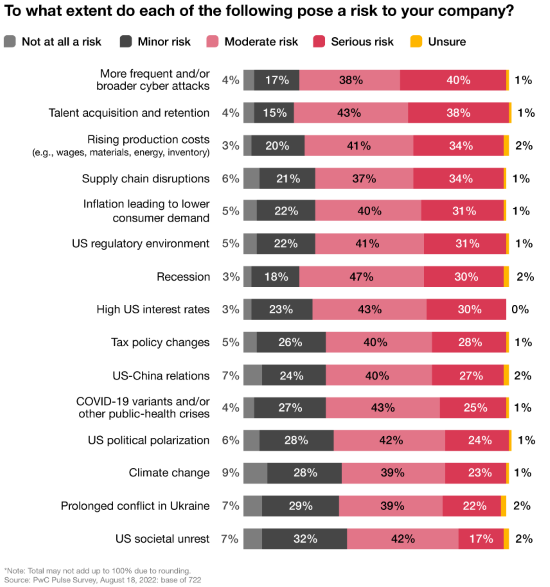Cybersecurity ranked most serious enterprise risk in 2022
.webp?t=1661967202)
Image from Unsplash
Uncertainty has become a business standard in 2022, with enterprise leaders feeling cautiously optimistic about their ability to navigate future economic, social and geopolitical uncertainty.
A survey of more than 700 U.S. executives by PricewaterhouseCoopers (PwC) identified top enterprise risks observed in 2022.
State of 2022 enterprise risk
The survey identified rising cyberattack levels; talent acquisition and retention; supply chain disruptions and increasing production costs to be the most serious risks facing enterprise organizations today.
 Image courtesy of PwC
Image courtesy of PwCCybersecurity
Amid increasing geopolitical tensions and consumer privacy concerns, 40% of business leaders ranked cybersecurity as the number one serious risk facing their companies. It’s not just top of mind for chief information security officers (CISOs) and chief risk officers (CROs) — executives across the entire C-suite ranked cybersecurity as a serious risk. In addition, 58% of corporate directors said they would benefit most from enhanced reporting around cybersecurity and technology.
With growth in mind, executives are increasing investments in digital transformation (53%), information technology (IT) (52%), and cybersecurity/privacy (49%).
Labor shortages
Nearly two-thirds of businesses (63%) have changed or are planning to change processes to address labor shortages, up from 56% in January 2022. Finding the right talent continues to be a challenge for business leaders. Talent acquisition came in second as a risk behind cyber, with 38% of respondents citing it as a serious risk.
In order to attract talent, companies continue to explore new ways of working, including expanding remote work options for roles that allow it. A large majority (70%) of respondents said they have either implemented this or have a plan in place. That, too, comes with risk, as the increase in remote work also comes with an expanded cyberattack surface for enterprise organizations.
To view the full survey results, click here.
Looking for a reprint of this article?
From high-res PDFs to custom plaques, order your copy today!



.webp?height=200&t=1705414638&width=200)



